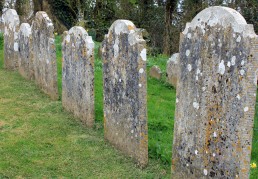Government guidance issued on PHA Funerals
The Ministry for Housing, Communities and Local Government have published a good practice guidance for local authorities who have to deal with Public Health Funerals.
Whilst not being a statutory document, the guidance sets out standards that a local authority should adhere to when dealing with a deceased person who may require a Public Health Act Funeral.
The guidance was written and developed following feedback received from several local authorities and they are designed to “protect public health and are important in ensuring that all individuals are treated with dignity and respect, regardless of their circumstances.”
Some local authorities have been criticised by the media for policies applied to Public Health Act Funerals, for instance not allowing a service for the deceased.
Recommendations are that:
- councils act considerately
- make efforts to trace next of kin
- adhere to any known wishes of the deceased
- act in a transparent manner
- attempt to recoup their costs as far as possible.
David Lockwood, Finders International’s Public Sector Development Manager and former council officer responsible for Public Health Funerals, welcomed the publication saying that:
“the guidance is long overdue and will help local authorities understand their collective responsibilities to provide a dignified service for the deceased and will help guide policies to ensure a minimum standard is set by all councils.”
He went on to add: “I am pleased to see the guidance recognise the work undertaken by probate genealogists, such as Finders International, in this sensitive area; we already work with many local authorities providing a free service to trace next of kin.”
The guidance states that if using a genealogist: “it is important to carry out due diligence to help ensure satisfaction with the provider.” This should include looking at a company’s accreditations, who they work with, if they hold ISO standards, what their cyber security policy is and their membership of professional bodies.
The full guidance can be read and downloaded from Gov.uk here - https://www.gov.uk/government/publications/public-health-funerals-good-practice-guidance
The PHFIS is intended as a guide for local authorities and hospitals who deal with public health funerals. If you would like to learn more about the PHFIS or require assistance, you can visit our website here. Alternatively, you can telephone: +44(0) 20 7490 4935 or email: [email protected]
Royal London finds funeral spend increasing
At a time when Local Authorities are under more scrutiny than ever before, the 2020 Public Health Act Funerals Conference is well placed to bring all parties together to discuss current provision, look at solutions and prepare for the future.
The recent Royal London report found that Local Authorities have spent in excess of £6.3m on on PHA funerals in the financial year up to March 2019.With one council, Birmingham, providing funerals for 387 residents in the year.
The report also highlights that there is no minimum standard for funerals provided. Royal London has called for the introduction of a minimum standard that allows families to attend a funeral and that ashes are returned to next of kin after a cremation, free of charge.
The Church of England General Synod will also be debating the matter and parliament have also made noises about change. The Government will increase the amount of the Funeral expenses payment in April from £700 to £1000. Whilst this is welcome, the amount paid still will not cover the cost of a basic funeral which means that the bereaved may have to turn to the Local Authority to provide a service.
David Lockwood, who runs the Public Health Funerals Information Service (PADSN) and organises the annual PHA Funeral Conference in association with Finders International said “I welcome the Royal London report and its call for a minimum standard”. He continued “it’s clear that staff work hard to provide a dignified service for the deceased, but they are put under financial constraints, a minimum standard will at least give them a framework they can follow. This will also end the postcode lottery meaning that the bereaved will know what they can expect.”
David is calling on all interested parties to attend the forthcoming PHA Funerals Conference at the Victoria Park Plaza Hotel on the 14th May. David stated that “it is an ideal opportunity for those seeking change to meet the Local Authority staff that provide the service, to see their compassion and commitment and to forge links to work together to improve the quality of service we give”.
Delegates can sign up now via the online form found here
PHA Funerals - "Unfit for purpose"
The legislation that gives local authorities the statutory powers to carry out funerals is not fit for purpose.
That’s what council officers told us at the second Finders International Public Health Act Funerals conference, which took place on 2nd May this year, and was attended by representatives of councils from all over England and Wales.
The legislation, which has been in place for more than thirty years, does not consider how attitudes have changed towards funerals in society and how we carry out funerals. Families are more fragmented and don’t necessarily feel obliged to make funeral arrangements for next of kin they may have had little or no contact with. Given recent rises in the amount of funerals undertaken by local authorities, it is only set to increase in the near future.
Minimum standards
Council officers at the conference felt that any reform should set out a minimum standard, although they could not agree on how this might be enforced. Some local authorities opt to cremate whilst others bury, but there is no standard practice. Should legislation make sure a deceased person’s wishes are adhered to (if they are known) and how would this be done?
As the Competition and Markets Authority is carrying out a review of the funeral industry in the wake of rising costs and is proposing a funerals regulator, perhaps the role of ensuring standards could be placed with them?
The majority thought that the word ‘paupers’ should not be used, with some officers reporting they found it to be offensive. Officers felt that the word does not show the deceased dignity and respect.
Little to no funding
Another point raised at the conference is that there is little or no funding within authorities for the provision of statutory funerals. Further discussions took place about a national funeral fund, with a radical suggestion that there should be a state grant paid from National Insurance contributions.
Certainly, everyone agreed that the Department of Work and Pensions (DWP) Social Fund is not fit for purpose, and a new way of state assistance needs to be found. The vast majority reported how difficult it is for people to claim and how little they receive to pay towards funerals from the DWP.
Staff have called for better awareness of their role by financial institutions. Once a person dies, GDPR does not apply to the deceased. Many officers reported their experiences where banks and other institutions make it extremely difficult for them to discover if the deceased left any assets.
Access to online accounts
They also said it was difficult to access the deceased’s emails and social media accounts, as sometimes emails and social media accounts can help officers trace families easily and quickly.
David Lockwood, Finders International Public Sector Development Manager and a former Public Health Act Funerals Officer, said: “It’s clear how dedicated council officers are in providing the best service possible despite the severe financial restrictions in place.
“These officers deserve the recognition for the service they provide to their communities and their continued dedication. We at Finders International do everything possible to support them with our free events and the advice we offer on our website, and we will continue to do so.”
Finders International has a funeral fund that can be used by public sector bodies to subsidise public health act funerals in cases that meet the criteria. Find out more about our service here.
Rise in Public Health Funerals puts even greater pressure on hard pressed local authorities
A recent survey of 70% of local authorities revealed that almost £5.5m was spent on Public Health Funerals in the year ending April 2018. During this period in excess of 3,800 people received a Public Health Act (PHA) funeral from a local authority.
Almost a third of these funerals were arranged as a result of bereaved families not being able to afford the cost of the funeral.
275 of 390 authorities responded to the survey, conducted by Royal London, meaning that a further 30% of local authorities, and therefore their expenditure on public health funerals, are not accounted for in these figure.
The cost of PHA funerals has also risen by 3.5% compared to 2017. This comes at a time of decreased central government funding for local authorities - forcing them to seek alternative ways of funding the increase.
The average cost for the local authority is reported at £1,403.00, though costs can be higher or lower depending on the authority.
David Lockwood, public sector development manager for Finders International and former local government officer responsible for PHA funerals said that the rise in costs did not surprise him.
“Having spoken to many former colleagues, I knew that the number of funerals is on the rise. It’s not surprising given how difficult it is to get any state aid from the DWP (Department for Work and Pensions)”.
It’s over 30 years since the law in England and Wales was changed and legislation in Scotland dates back to 1948. “Local authorities need more clarity on their role - what they can and cannot do.”
“Practice varies across the country with some authorities allegedly banning relatives from funerals while others strive to ensure they are inclusive. Staff undertaking these funerals are under pressure to keep costs down, but they all care and are committed to providing the deceased with a service that is respectful and dignified.”
Mr Lockwood is calling on central government to look at the problem and find solutions as quickly as possible.
While local authorities are entitled to recover costs under legislation; some struggle to do so with their workloads. Many local authority staff report difficulties in obtaining funds from banks that hold cash belonging to the deceased.
Danny Curran, Managing Director of Finders International, said: “Local authorities can turn to companies like us, Finders International, for help in tracing next of kin. We offer a free and efficient service to try and trace next of kin so that hard pressed local authorities don’t have to take on the financial burden.”
Finders International has a record of assisting local authorities. All local authorities are eligible to access the Finders International Funeral Fund, a charitable fund that supports councils when a deceased has no estate and no known next of kin. Finders also offers free conferences and website support to local authorities undertaking Public Health Act Funerals.
ICCM Public Health Act Funerals Policy Statement
Following recent media reports on provision of PHA funerals the ICCM has published a policy statement on their website outlining the duties of each local authority providing PHA Funerals.
The statement calls for all local authorities with the statutory responsibility for providing a service to publish their policies on their website, setting out clear guidelines to the public and calling for the words "paupers" and "destitute" to be avoided due to their insensative nature.
You can read the Policy Statement here:
ITN highlight rise in “Paupers” Funerals
ITN highlighted the rise of funerals undertaken by Local Authorities and the difference in services provided by Authorities on their main news bulletins on Friday 15th June.
Watch the report and read more about it on the ITV news website.




